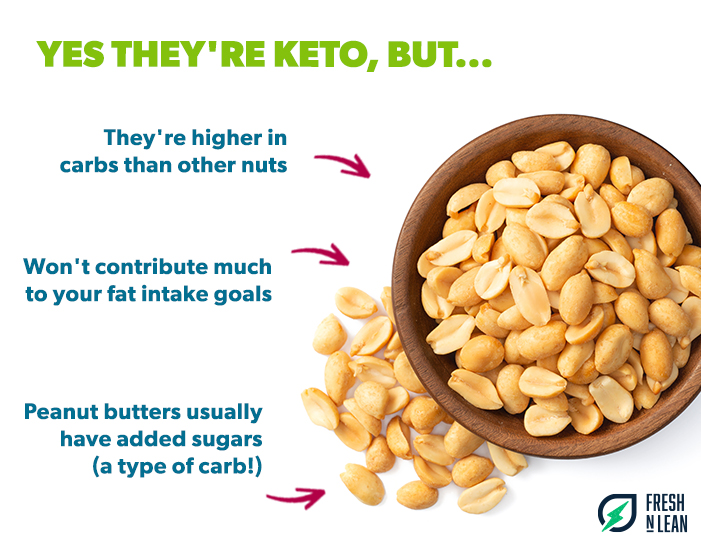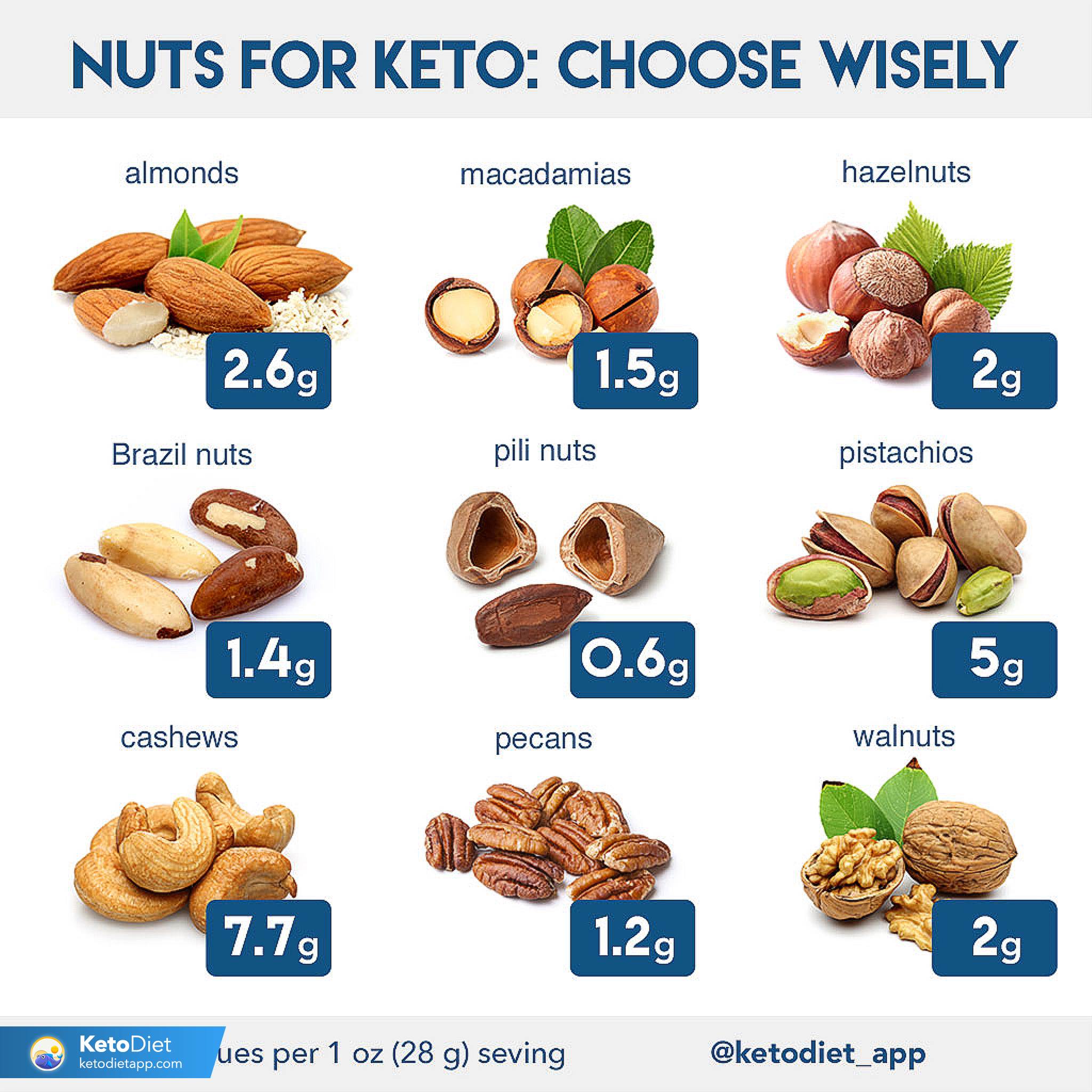For those adhering strictly to a ketogenic diet, the inclusion of peanuts might be surprisingly contentious. Despite being a popular snack, peanuts are technically legumes, often raising doubts about their compatibility with keto principles. However, a deeper dive suggests that their moderate carbohydrate content allows for careful inclusion in a keto meal plan.
Historically, peanuts have been cultivated for over 7,000 years, symbolizing a longstanding dietary staple. From the nutritional standpoint, a typical serving contains about 6 grams of net carbs, aligning relatively well with keto macros when consumed in moderation. This makes peanuts a viable, albeit limited, option for those committed to maintaining ketosis.

What is a Keto Diet and its Basic Principles
The keto diet, short for ketogenic diet, focuses on high fats, moderate proteins, and very low carbohydrates. This diet triggers a state called ketosis, where the body burns fat instead of carbs for energy. Entering ketosis is the main goal of keto dieters.
Attention to macronutrient ratios is essential in keto. Typically, you’ll consume about 70-75% of calories from fat, 20-25% from protein, and only 5-10% from carbs. This balance helps maintain ketosis and supports weight loss and other health benefits.
Low carb intake is critical in the keto diet. Limiting carbs to about 20-50 grams daily forces the body to use fat as its primary energy source. This shift can lead to faster weight loss and improved mental clarity.
Many find the keto diet appealing for its various health benefits. Beyond weight loss, it may improve heart health and reduce blood sugar levels. However, it’s important to consult with a healthcare professional before starting any new diet.
Understanding Peanuts: Overview and Nutritional Facts
Peanuts, a favorite snack for many, are botanically classified as legumes. Despite this, they are often grouped with nuts due to similar nutritional profiles. They have been cultivated for thousands of years, primarily in South America.
Nutritional Composition of Peanuts
Peanuts are rich in protein, making them an excellent plant-based protein source. Each serving provides about 7 grams of protein, crucial for muscle repair and growth. Additionally, they contain healthy fats, primarily monounsaturated and polyunsaturated fats, beneficial for heart health.
Apart from protein and fat, peanuts also offer significant vitamins and minerals. They are good sources of Vitamin E, B vitamins, and essential minerals such as magnesium, phosphorus, and potassium. This diverse nutrient profile makes peanuts a healthy addition to balanced diets.
However, peanuts are also calorie-dense. A small handful can go a long way in terms of energy. It’s crucial to practice portion control to avoid excessive calorie intake.
Health Benefits of Peanuts
Peanuts have numerous health benefits, thanks to their impressive nutrient content. Regular consumption can help lower bad cholesterol levels due to their healthy fats. This can prevent heart disease and support overall cardiovascular health.
They are also rich in antioxidants, which help to protect cells from damage by free radicals. This can reduce the risk of chronic diseases like cancer. The fiber content in peanuts helps support healthy digestion and can keep you full for longer.
Moreover, peanuts can aid in weight management. Despite being high in fats, the type of fats and the protein content can help you feel satiated, reducing overall calorie consumption.
Possible Risks and Allergens
While peanuts offer many health benefits, they are also a common allergen. Peanut allergies can be severe, leading to anaphylaxis in some cases. It’s essential to be cautious and consult a healthcare provider if you’re unsure about allergies.
Another concern is the potential for aflatoxin contamination. Aflatoxins are toxic compounds produced by certain molds and can be harmful in large quantities. Proper storage and choosing reputable brands can mitigate this risk.
Lastly, consuming excessive peanuts can lead to weight gain due to their high calorie and fat content. Always consider moderation and read labels for added sugars and oils.
Are Peanuts Low Carb: A Deeper Dive
When it comes to carbs, peanuts might surprise you. A serving of peanuts, about 28 grams, contains roughly 6 grams of total carbs. Out of these, around 2 grams are dietary fiber, making the net carbs about 4 grams.
This places peanuts on the lower end of the carb spectrum, especially compared to other snack foods. Their low net carb content can make them suitable for low-carb diets like keto. However, moderation is still essential to avoid overconsumption.
Comparatively, peanuts fare well against other nuts. For example, almonds have about 6 grams of total carbs per serving, while cashews can have up to 9 grams. This relatively low carb content can make peanuts an appealing choice for those tracking their carbohydrate intake.
Additionally, peanuts offer a variety of other nutrients. The combination of proteins, healthy fats, and fiber makes them a balanced snack option. Just remember to keep an eye on portion sizes to maintain a low-carb diet effectively.
Integration of Peanuts in a Keto Diet
Peanuts can be a beneficial addition to a keto diet when managed carefully. Their low net carb content makes them a viable snack option. However, portion control is crucial to stay within daily carb limits.
One way to enjoy peanuts on a keto diet is by incorporating them into recipes. For instance, you can add chopped peanuts to salads for extra crunch and nutrition. Peanut butter, preferably unsweetened, can also be used in various keto-friendly dishes.
Snacking on peanuts between meals can help maintain energy levels. They’re portable and easy to keep on hand for quick, nutritious snacking. Just be sure to measure servings to avoid accidental carb overload.
Peanuts can also be ground into flour for keto baking. Peanut flour adds flavor and protein to baked goods like keto cookies or bread. This can make transitioning to a keto diet more enjoyable and sustainable.
Additionally, pairing peanuts with other low-carb foods enhances their benefits. Combining them with cheese or low-carb vegetables creates a balanced, satisfying meal. This approach helps diversify your diet while keeping you within keto guidelines.
While peanuts are keto-friendly, always check labels for additives. Some packaged peanuts may contain added sugars or unhealthy oils. Opt for plain, raw, or dry-roasted peanuts to stay on the safe side.
Other Legumes on a Keto Diet
Legumes generally contain higher carbohydrate levels, which can pose challenges for those on a keto diet. Beans, lentils, and chickpeas usually have substantial carb content. This makes them less suitable for maintaining ketosis.
However, some legumes are lower in carbs and might fit into a keto plan with careful portioning. For example, green beans and black soybeans are relatively low in carbs. These options can be included in small amounts, providing fiber and nutrients without breaking ketosis.
Below is a comparison of the carb content in different legumes per 100 grams:
| Legume | Carbs (g) |
|---|---|
| Green Beans | 7 g |
| Black Soybeans | 10 g |
| Chickpeas | 27 g |
| Lentils | 20 g |
When integrating legumes into a keto diet, it’s vital to balance them with other low-carb foods. Incorporating high-fat ingredients can help maintain the required macronutrient ratios. Options like avocado, cheese, or olive oil can be paired with legumes to keep your meals keto-friendly.
It’s always important to monitor total daily carb intake. Tools and apps can help track food intake and ensure you’re staying within keto limits. Being mindful of portion sizes and ingredient choices is essential for success on a keto diet.
While legumes offer nutritional benefits, they should be consumed cautiously on a keto diet. Consulting with a healthcare provider can help you determine how best to include them without disrupting ketosis. This balanced approach ensures you receive the legume’s benefits without compromising your dietary goals.
Potential Benefits and Risks of Including Peanuts in a Keto Diet
Peanuts offer several benefits when included in a keto diet. They are rich in protein, which is crucial for muscle maintenance and overall energy. The healthy fats in peanuts also help keep you feeling full for longer periods.
Another benefit is their high fiber content. Fiber aids in digestion and supports gut health. This can be especially helpful on a keto diet, which can sometimes lead to digestive issues due to a lack of fiber-rich foods.
Beyond these benefits, peanuts contain a variety of vitamins and minerals. These include Vitamin E, magnesium, and potassium, all of which are essential for maintaining good health. Incorporating peanuts can help ensure you get a balanced range of nutrients.
However, there are risks to consider. Peanuts are calorically dense, meaning it’s easy to overconsume them and exceed your daily calorie limits. This can hinder weight loss goals and overall keto progress.
Peanuts are also a common allergen. For individuals with peanut allergies, even small amounts can cause severe reactions. It’s crucial to be mindful of this and opt for alternative snacks if necessary.
Lastly, certain peanut products may contain added sugars or unhealthy fats. Always check labels to ensure you’re choosing plain or minimally processed options. This helps you avoid hidden carbs and stay on track with your keto diet.
Key Takeaways
- You can eat peanuts on a keto diet in moderation.
- Peanuts have around 4 grams of net carbs per serving.
- Monitoring portion sizes helps maintain ketosis.
- Peanuts offer protein and healthy fats.
- Avoid added sugars in peanut products for keto compliance.

Frequently Asked Questions
If you’re curious about fitting peanuts into your keto diet, look no further. These frequently asked questions will guide you through the essentials.
1. How many peanuts can I have on a keto diet?
You can have approximately 28 grams, or about a small handful of peanuts, on a keto diet. This serving size offers around 4 grams of net carbs, which fits within the carb limits for ketosis.
However, moderation is key to avoiding overconsumption and staying in ketosis. Always monitor your portion sizes and stay within your daily carb allowance for optimal results.
2. Are peanut butter and peanuts equally good on a keto diet?
Both peanut butter and peanuts can be good options for a keto diet if chosen wisely. Opt for natural peanut butter that doesn’t contain added sugars or unhealthy oils to keep it keto-compliant.
When consuming peanuts, choose raw or dry-roasted varieties without added oils or flavors. Both forms provide healthy fats and proteins crucial for maintaining a balanced ketogenic meal plan.
3. Can peanuts kick me out of ketosis?
If eaten in moderation and within your daily carb limit, peanuts are unlikely to kick you out of ketosis. Their relatively low net carb content makes them suitable for low-carb diets like keto.
However, overeating any high-carb food can risk disrupting ketosis. Always track your carbohydrate intake carefully to ensure you remain within the required limits for maintaining ketosis.
4. What are some keto-friendly ways to eat peanuts?
Pep up your salads by adding chopped peanuts for an extra crunch and dose of nutrients. Another tasty idea is blending unsweetened peanut butter into smoothies or using it as a dip for low-carb veggies like celery sticks.
You can also make delicious keto-friendly desserts with peanut flour or use ground peanuts in baking recipes. These options allow variety while keeping meals aligned with ketogenic principles.
5. Are there alternatives to peanuts that are more suitable for keto?
If you’re looking for other nut options, macadamia nuts and almonds are excellent choices on a keto diet due to their lower net carb content compared to many other nuts.
Pecans and walnuts are also good alternatives; they offer healthy fats while being lower in carbs than legumes like chickpeas or lentils. Always consider portion sizes to support your overall macro goals effectively.

Conclusion
Including peanuts in your keto diet can be a smart choice if managed carefully. Their low net carb content along with healthy fats and proteins make them a suitable snack option. However, portion control is crucial to maintain ketosis effectively.
By integrating peanuts in moderation, you can enjoy their nutritional benefits without compromising your keto goals. Always opt for natural, minimally processed varieties and track your intake diligently. This balanced approach helps you achieve a well-rounded and sustainable ketogenic diet.
